New security-state documents show Wellington aligning its military with the “rules-based international order” while preparing Kiwis for war with key trading partner China, writes Mick Hall.
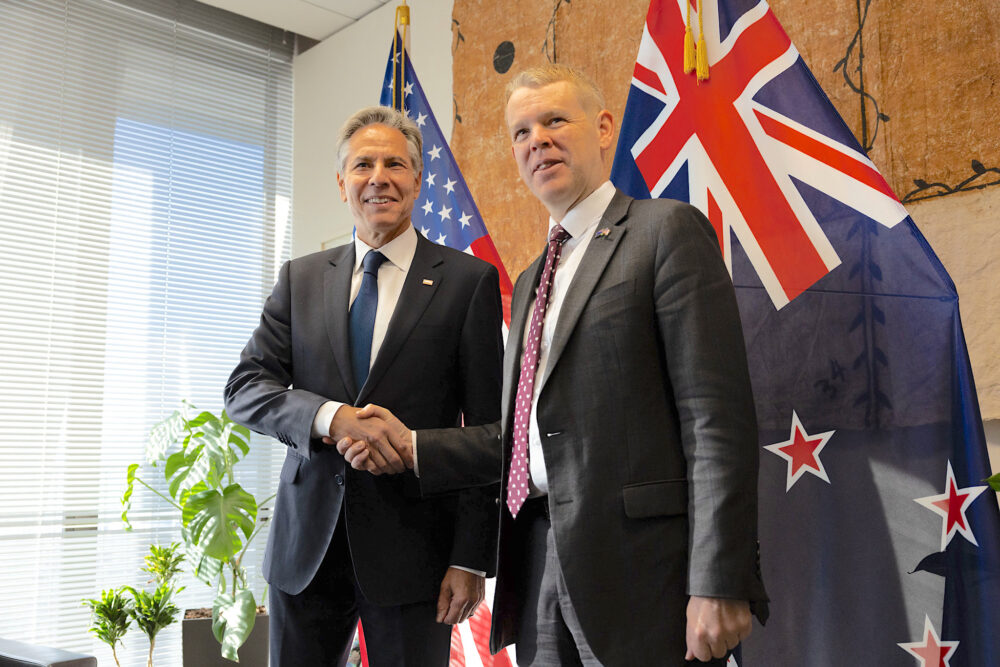
U.S. Secretary of State Antony Blinken with New Zealand Prime Minister Chris Hipkins in Wellington on July 27. (State Department, Chuck Kennedy, Public domain)
By Mick Hall
in Whangarei, New Zealand
Special to Consortium News
R ecent reports from New Zealand’s security state have sparked protest after all but suggesting the country join the U.S.-led AUKUS military alliance, a move that would reverse years of New Zealand’s independent foreign and defence policy and put it on a collision course with China.
ecent reports from New Zealand’s security state have sparked protest after all but suggesting the country join the U.S.-led AUKUS military alliance, a move that would reverse years of New Zealand’s independent foreign and defence policy and put it on a collision course with China.
Ex-Labour Prime Minister Helen Clark lamented the loss of what would remain of the country’s military sovereignty. Clark blasted an “orchestrated campaign” by defence and security officials to join the U.S., Britain and Australia in AUKUS.
In a Twitter thread, she said the government was “abandoning its capacity to think for itself and is instead cutting & pasting from Five Eyes partners.” New Zealand is part of a five-nation intelligence sharing arrangement with Australia, Britain, Canada and the United States.
Clark tweeted that “there appears to be an orchestrated campaign on joining the so-called ‘Pillar 2’ of #AUKUS which is a new defence grouping in the Anglosphere with hard power based on nuclear weapons.” The former prime minister quoted from an op-ed article in The Post by academic Robert G. Patman, who wrote that “Aukus has already been criticised for fuelling nuclear proliferation” in the Pacific. “Implication is that this is not something with (sic) #nuclearfree NZ should associate,” Clark tweeted.
1. Defence policy & security strategy documents released in Wellington today suggest that NZ is abandoning its capacity to think for itself & instead is cutting & pasting from 5 Eyes’ partners. Drumbeat from officials has been consistent on this for some time.
— Helen Clark (@HelenClarkNZ) August 4, 2023
Clark quotes Patman as saying: “Staying outside #Aukus would avoid reputational damage to New Zealand’s non-nuclear security policy in the eyes of other states, and complement the strategic goal of diversifying Wellington’s trade ties in the Indo-Pacific region.”
Clark says Patman concludes “the Case for NZ staying outside #AUKUS with: ‘Finally, it is important NZ is clear-eyed about possibility that Aukus could constrain its foreign policy autonomy.'”
Clark says, “IMHO NZ needs a full public debate on this & not an officialdom-driven realignment. … Furthermore, detachment is consistent with #NZ’s distinctive worldview …”
Nuclear Free Act 1987
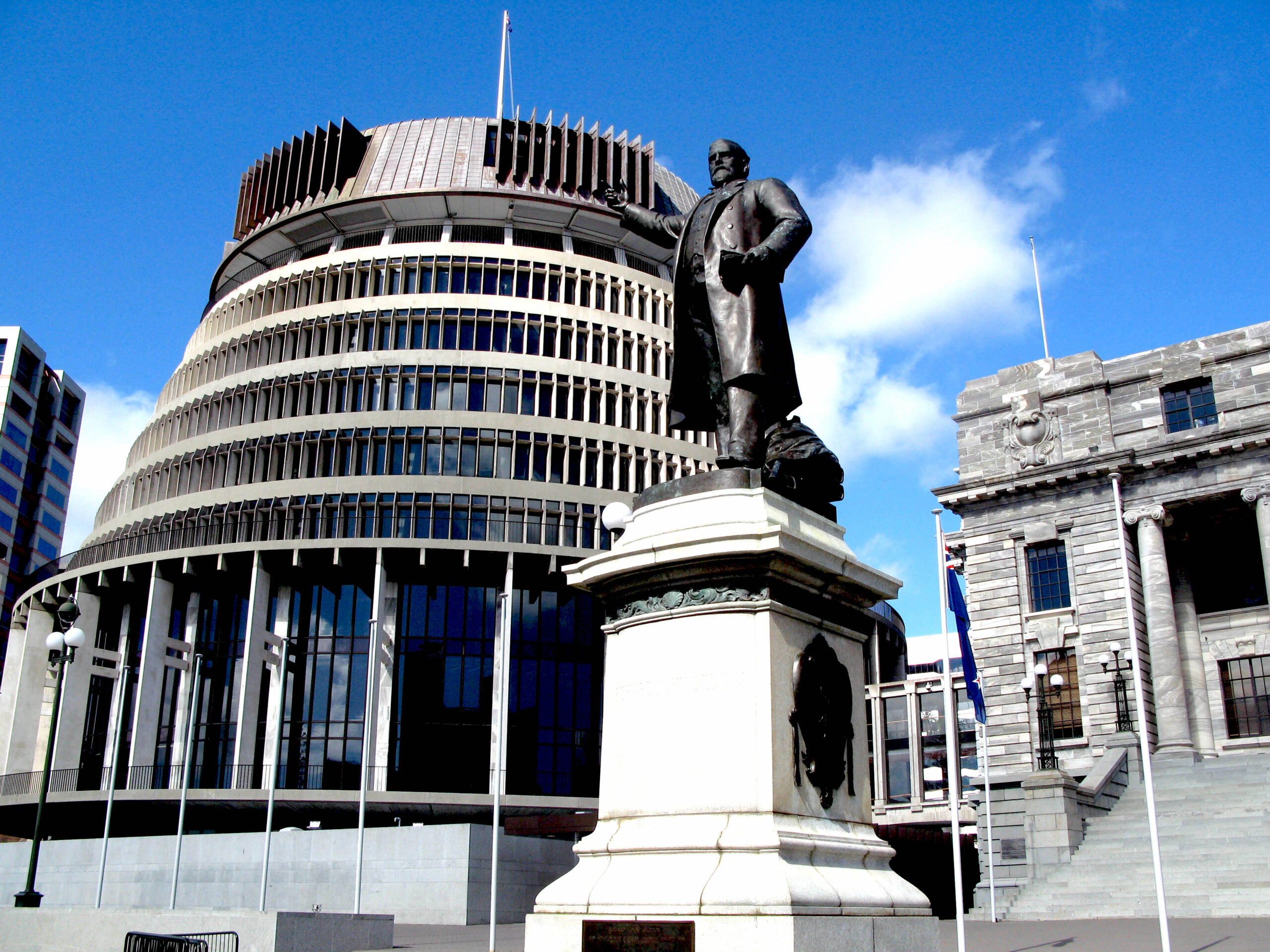
Executive wing of New Zealand Parliament, known as the Beehive, Wellington. (Mcbreenwiki2, Wikimedia Commons, CC BY-SA 4.0)
The direction of a growing New Zealand militarism could indeed raise questions over the future of the country’s nuclear free policy.
In 1984, after decades of campaigning against nuclear testing in the Pacific and increasing public objections to visiting U.S. warships, New Zealand under the then Labour Prime Minister David Lange, banned nuclear-powered or nuclear-armed ships from using its ports and waters.
Under the New Zealand Nuclear Free Zone, Disarmament, and Arms Control Act 1987, the country became a nuclear-free zone.
That legislation is seen as a defining exercise of national sovereignty and became part of New Zealanders’ cultural identity, particularly after French secret service agents in 1985 bombed Greenpeace’s Rainbow Warrior vessel, moored at Auckland harbour, to prevent it leaving for further protests against France’s nuclear tests at Mururoa Atoll. One crew member was killed.
The Act prohibits
“entry into the internal waters of New Zealand 12 nautical miles (22.2km) radius by any ship whose propulsion is wholly or partly dependent on nuclear power and bans the dumping of radioactive waste into the sea within the nuclear-free zone, as well as prohibiting any New Zealand citizen or resident ‘to manufacture, acquire, possess, or have any control over any nuclear explosive device.'”
When the AUKUS deal to help Australia build nuclear-powered submarines was announced in September 2021, New Zealand’s then Prime Minister Jacinda Ardern said the submarines would be banned from entering the nuclear-free zone, though she said that wouldn’t change New Zealand’s Five Eyes security and intelligence ties.
The Road to AUKUS
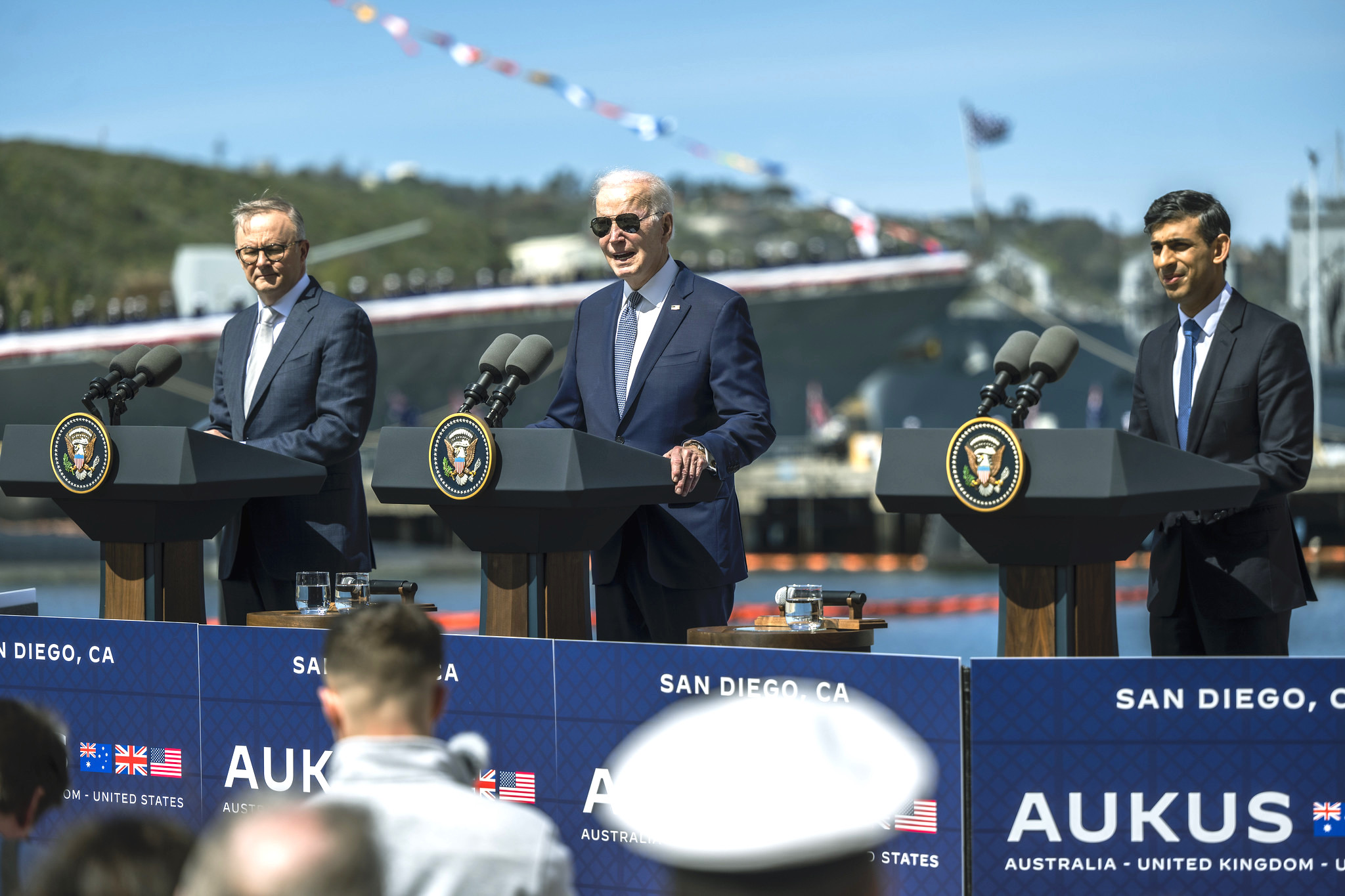
Australian Prime Minister Anthony Albanese, U.S. President Joe Biden and British Prime Minister Rishi Surnak at a press event for AUKUS in San Diego on March 13. (DoD photo by Chad J. McNeeley)
The U.S. has been involved in efforts to contain China in its own backyard, while dangerously increasing tensions between Beijing and Taiwan. This has involved increased diplomatic support for the Taiwanese independence movement as well as concluding weapons deals with the self-governing island, which China sees as an integral part of its own territory.
Official U.S. policy also recognises Taiwan as part of the People’s Republic of China.
AUKUS could play a central role in a U.S. containment strategy. Australia confirmed in March it would buy three U.S.-manufactured nuclear submarines for A$368 billion over the next three decades, with an option of buying two more, as part of the AUKUS pact.
The AUKUS deal has been controversial in Australia. It increases tensions between Canberra and Beijing where before there were virtually none. Australia’s decision to join AUKUS and enter into the submarine deal was concluded by Prime Minister Anthony Albanese without consultation with Parliament, let alone with the Australian people.
AUKUS has been blasted by former Australian Labor Prime Minister Paul Keating who said:
“We are now part of a containment policy against China. The Chinese government doesn’t want to attack anybody. They don’t want to attack us … We supply their iron ore which keeps their industrial base going, and there’s nowhere else but us to get it. Why would they attack? They don’t want to attack the Americans … It’s about one matter only: the maintenance of U.S. strategic hegemony in East Asia. This is what this is all about.”
Blinken in New Zealand
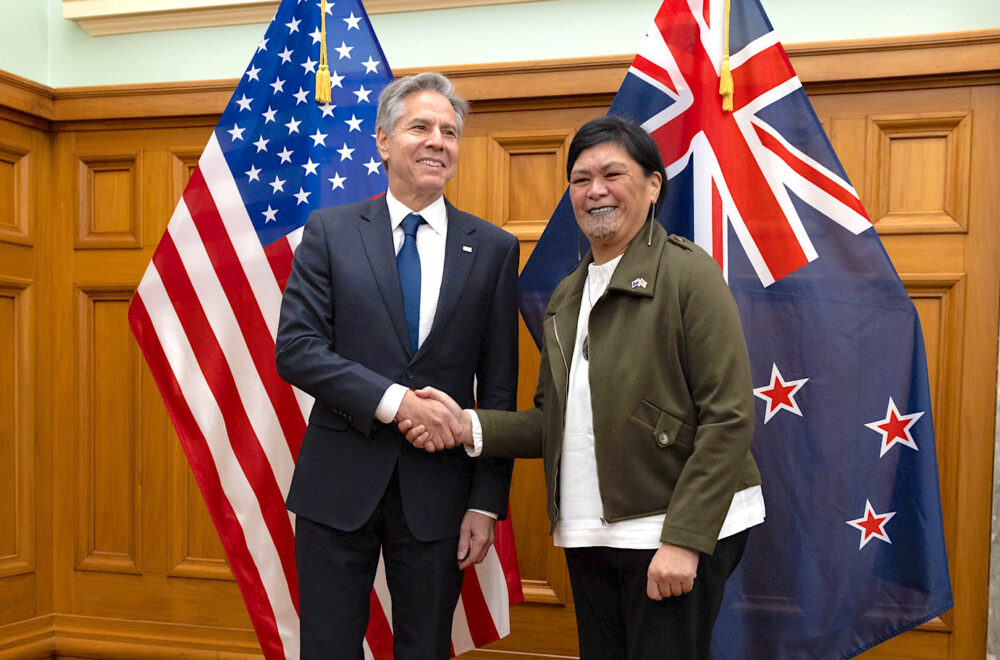
U.S. Secretary of State Antony Blinken and New Zealand Foreign Affairs Minister Nanaia Mahuta in Wellington on July 27. (State Department, Chuck Kennedy, Public domain)
After U.S. Secretary of State Antony Blinken’s visit to Wellington last month, New Zealand Foreign Minister Nanaia Mahuta told media the government was not contemplating joining AUKUS.
However, a new Defence Policy and Strategy document, one of a raft of recent government papers on the issue, says: “AUKUS Pillar Two may present an opportunity for New Zealand to cooperate with close security partners on emerging technologies.”
During his own press conference with Blinken, Prime Minister Chris Hipkins said the government was “open to conversations” about AUKUS membership.
Three decades after it took the country out of ANZUS (consisting of Australia, New Zealand and the U.S.), Labour would turn full circle if it signed up to the AUKUS pact while in power. The U.S. suspended its obligations to New Zealand under the 1951 ANZUS Treaty in retaliation for the nuclear-free policy introduced in 1987 by Labour.
A decision to join AUKUS will be one for the next government after October’s general election. According to recent polling, the country’s right-wing opposition party, National, could govern alongside the far-right, libertarian Act Party.
‘Don’t Need Enemies Where Enemies Don’t Exist’
Other dissenting voices beside Clark’s were largely absent in the New Zealand mainstream media. Yet there is deep unease in some quarters over how the security state documents collectively frame China as a threat to the strategic balance in the region, portraying it as the one country New Zealand must prepare to face militarily.
Consortium News spoke with the National Party’s foreign affairs and defence spokesman Gerry Brownlee, who said that the ruling Labour Party’s position on AUKUS — and on defence in general — had shifted much closer to his own party in recent years.
He said New Zealand’s proposed involvement in AUKUS had yet to be defined and there would be no immediate moves to join the alliance.
He was cautious, however, about jeopardizing trade with China and emphasised a need to protect and promote what he called New Zealand’s liberal democratic values.
“We don’t need to make enemies where enemies don’t exist, but we need to keep our eyes open and look at all the risks,” he said.
Former general-secretary of the Labour Party, Mike Smith, told Consortium News discussions within the Labour government over AUKUS were ongoing.
“My understanding is that officials have been tasked with investigating the pros and cons of what AUKUS Pillar 2 might involve and that a paper on this will be brought to Cabinet in due course,” Smith said. “I think the issue is not settled yet inside this government and there will certainly be debate outside the official process.”
Smith said he didn’t believe the country’s nuclear free position was under immediate threat but he remained wary.
“I think there are some among our officials who think that New Zealand’s nuclear free legislation has passed its use-by date. I do not see any possibility of it being changed in the near term, but I think this view should be flushed out,” he said.
He backed former Labour Prime Minister Clark’s comments that the recent spate of security and defence documents were Five-Eyes “copy and paste” jobs.
“I think there is a great danger that New Zealand’s foreign policy is being led by the security agencies prioritising U.S.-led Five Eyes strategies focused on China, which poses no threat to New Zealand but does threaten U.S. unipolar dominance and neoliberal economics,” Smith told CN. He said:
“China offers development for mutual prosperity in a multipolar world and the U.S. demands we purchase arms from them for use in possible war, which means a large opportunity cost to the detriment of our social policy.”
Approximately a quarter of all New Zealand’s export trade is destined for China.
‘We Want Nothing To Do with AUKUS’
Indigenous party Te Pati Maori co-leader, Rawiri Waititi, agreed the security state documents were politically coloured in a way that did not present objective facts on the country’s security. “Government agencies and government bureaucrats are not apolitical,” he told Consortium News.
Waititi poured cold water on a New Zealand Security Intelligence Service (NZSIS) report that China should be a concern for New Zealand.
“There is no specific evidence supporting the narrative that Russia, North Korea and Peoples Republic of China (PRC) are interfering in Aotearoa’s [New Zealand] politics,” he said.
“There is clear evidence that repurposed white supremacy from the USA is the major threat to our democracy given the digital hate traffic directed at Maori.”
The New Zealand spy agency also warned rising social and economic inequality — as inflation and a global downturn created further hardship — were expected to contribute to the radicalisation of violent extremists in New Zealand. It admitted the main threat of violent extremism came from white supremacists.
On the broader security and defence themes, Waititi was adamant.
“We want nothing to do with AUKUS. We want nothing to do with nuclear-powered or armed naval capacity,” he said.
“Our Nuclear Free Act 1987 is a guiding principle and military neutrality is a natural evolution of that policy. Internationally, Aotearoa must be friends to everybody and enemies to nobody,” Waititi said.
The Security State’s Arguments
NZSIS published its unclassified report on June 11, identifying what it calls rising strategic competition, technological innovation, global economic instability and falling public trust as factors driving violent extremism, foreign interference and espionage.
Following the U.S. line, the report claimed China, Russia and Iran were responsible for instances of foreign interference, mainly the monitoring of expatriate communities, posing a potential risk of significant harm.
The spy agency warned that foreign nations would more likely resort to espionage and interference to advance competing visions of regional and global orders as “opportunity for statecraft” diminished amid rising geopolitical tensions. It did not say who would be responsible for this loss of opportunity. The report said:
“What is foreseeable is that an increasing competition between states creates fewer opportunities for more collaborative approaches to statecraft. As a result, we see greater incentives for states to reach for covert tools such as espionage and interference. This situation is especially evident in an environment where some states are moving away from, and attempting to rewrite, accepted international rules and norms of state behaviour. In a complex strategic environment, more states are likely to turn to intelligence to avoid surprise and gain an advantage.”
The agency said China’s efforts to expand its power in the Pacific was a “major factor driving strategic competition in our home region.”
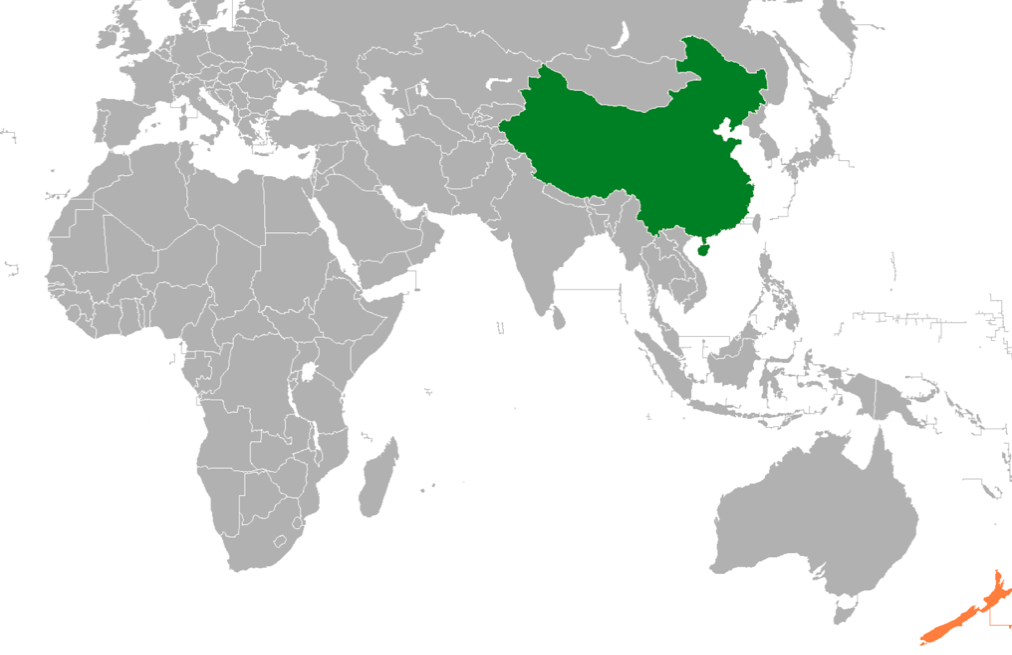
Map indicating locations of China and New Zealand. (Phoenix500, Wikimedia Commons, CC0)
The NZSIS document added:
“PRC has significant and growing intelligence and security capabilities, and its efforts are increasing New Zealand’s exposure to the consequences of strategic competition.”
Little Consolation
A week earlier New Zealand Defence Minister Andrew Little had introduced three other security and defence documents to the public at Parliament in Wellington.
He told a select crowd that included diplomats, academics and MPs:
“We no longer live in a benign strategic environment. … We must be prepared to equip ourselves with trained personnel, assets and material, and appropriate international relationships in order to protect our own defence and national security – and we are.”
Defence Policy & Strategy Statement

New Zealand Defence Minister Andrew Little, right, with U.S. Defense Secretary Lloyd Austin in Singapore in June. (DoD, Chad J. McNeeley)
One of the documents, the 37-page Defence Policy and Strategy Statement, focused on the need to make the country’s military “operationally credible,” enabling it “to act earlier to prevent threats, for example through increased presence, as part of broader New Zealand efforts and in concert with international partners.”
“Where possible, Defence will seek to act to constrain hostile actions, will be prepared to employ military force, and engage in combat if required,” it added.
The statement stated the goal would be to prevent states that don’t share the country’s “values” from establishing a “military or paramilitary presence” in the region. It advocated greater New Zealand military deployments in the Pacific region.
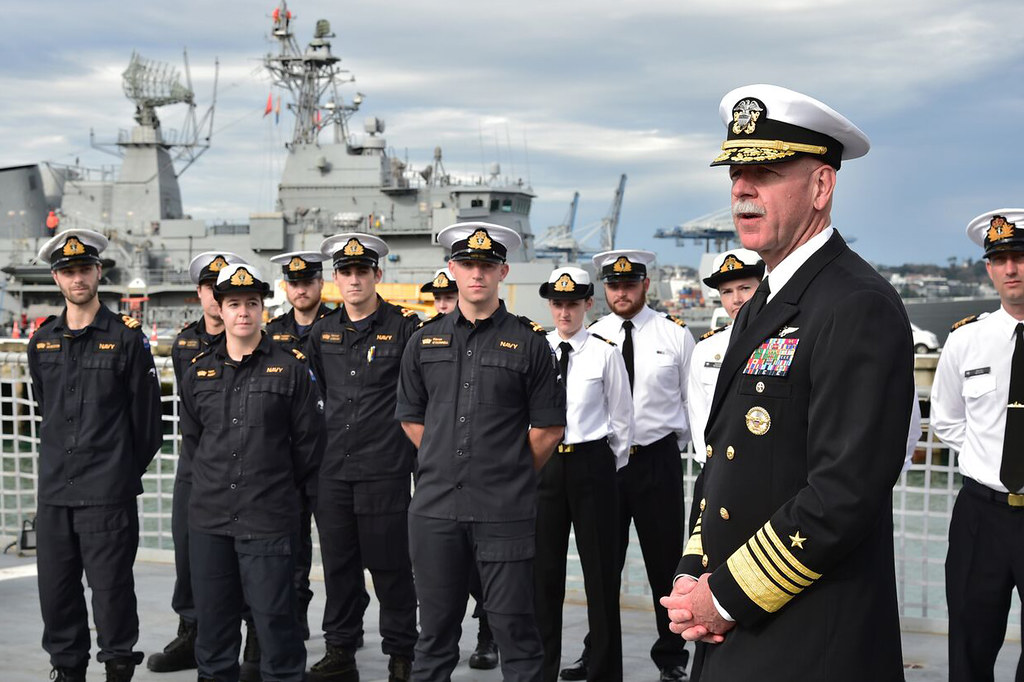
June 2017: U.S. Adm. Scott Swift, commander of U.S. Pacific Fleet, thanking New Zealand sailors for their work with the Nimitz Carrier Strike Group in the Western Pacific. (U.S.-Indo Pacific Command/Royal New Zealand Navy)
Like the spy agency report, the document flagged China’s “political, economic, and security influence” in the Pacific, which it claimed was “at the expense of more traditional partners such as New Zealand and Australia.”
“An increasingly powerful China is using all its instruments of national power in ways that can pose challenges to existing international rules and norms,” it said.
“Beijing continues to invest heavily in growing and modernising its military and is increasingly able to project military and paramilitary force beyond its immediate region, including across the wider Indo-Pacific.”
The statement makes no mention of the steady build up of U.S. forces in the region, including new bases near China, such as in Australia and the Philippines, as well as naval assets patrolling the South China Sea. The statement does not entertain the possibility that China’s military activity is defensive in response to the growing U.S. presence.
A Future Force Design Principles document in addition sets out how the military would be reconfigured to meet these supposed new threats.
The release of these defence documents came after a Defence Policy Review, commissioned by the government in 2022.
National Security Strategy
A new, U.S.-style National Security Strategy, the first of its kind in New Zealand, delineated 12 main areas of concern to security agencies, including strategic competition, disinformation, foreign interference, terrorism, economic security, Pacific security and cyber, border, maritime and space security.
It pointed to potential flashpoints in Taiwan, the South China Sea and East China Sea.
The strategy noted China’s efforts to build ports and airports in the Pacific, which it said could have both civilian and military purposes.
“The 2022 China-Solomon Islands security agreement and ongoing attempts to create new groupings in the Pacific demonstrate China’s ambition to link economic and security cooperation, create competing regional architectures, and expand its influence with Pacific Island countries across policing, defence, digital, and maritime spheres,” it said.
The document emphasised it was important for New Zealand to partner with other nations tied to the Five Eyes intelligence apparatus, as well as others, including Japan and South Korea.
It gave direction to New Zealand’s intelligence community to navigate the emerging geopolitical terrain, including the publication of an annual threat report, alongside a ministerial speech, as well as building trust among the public.
The plans will now cost billions of dollars. New Zealand spends approximately 1 percent of GDP on defence. Little said he expected that would rise, but that it was unlikely to reach to 2 percent, the level spent by Australia and some NATO-aligned countries.
Mick Hall is an independent journalist based in New Zealand. He is a former digital journalist at Radio New Zealand (RNZ) and former Australian Associated Press (AAP) staffer, having also written investigative stories for various newspapers, including the New Zealand Herald.

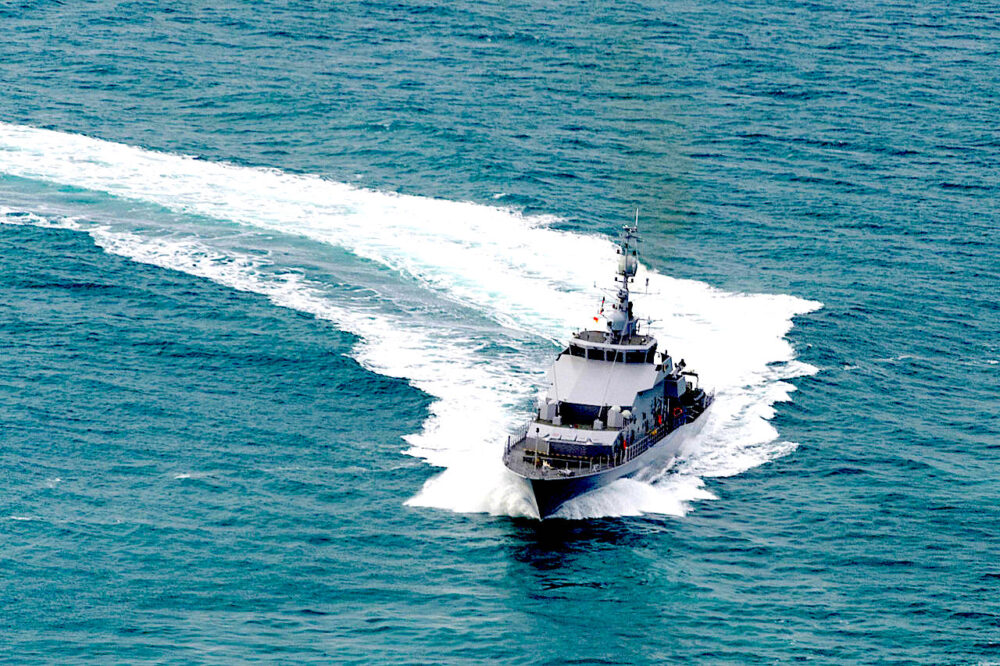
Twenty years ago, the US-led “Coalition of the Willing” invaded Iraq. Despite enormous pressure from traditional English-speaking allies, the Clark Labour Government of New Zealand refused to participate. New Zealand seemed to us a unique and genuine alternative. We left the States and made our home here. Today we watch in dismay as Aotearoa sleepwalks towards unnecessary, unprovoked and dangerous US-led confrontation with China. Thank you, Mick Hall and Helen Clark, for keeping the light on in the growing, unspeakably sad and terrifying darkness.
You forgot to include and thank the wonderfully articulate Waititi as well. Every non-White person would be proud of White gentleman like yourself for speaking out objectively and standing up for the truth and justice. New Zealand elites who stood up for an independent foreign policy by not joining the COWs in the past deserve to be lauded and should be encouraged to uphold something similar on this round of fear-mongering and threat-hawking as well !
Will they ever learn??? Associate with the Americans and end up with burning your fingers
When even former PM Helen Clark gets uneasy of labour’s all too willing subjugation to US/UK driven anti-China Pacific policy, Kiwis should be very worried! There is an upcoming election, and make no mistake, the labour party will use this, if it gets back into government, as a mandate to implement all what has been so far only chit chat.
Little tries to minimise the look of military spending by saying it would be under 2% of GDP. Not quite doubling. But remember NZ Govt spending, from which military spending wholly comes, amounts to normally less than 20% of GDP. Am I correct in supposing that the proportion of governement spending on military could so have to rise to 5 times that 2% or to 10%. What would have to give?
I, too, am very pleased to see Mick Hall’s article here. In a comment on an earlier story, I remarked that at least here, his work will be read. Unlike on the RNZ website.
I’m also very concerned about what’s happening in the South-West Pacific, NZ’s increasing involvement in AUKUS, and – aside from the paywalled Patman article and Clark herself – the complete failure of our MSM to provide us with any analysis of the above sort. I note further that the current government hasn’t sought a mandate from the voters for its involvement.
Some years back, I recall President Obama announcing the US “Pivot to Asia”, which of course just turned out to be constant needling of China. The consequences of that, which we now see, were predictable.
“Clark blasted an “orchestrated campaign” by defence and security officials to join the U.S., Britain and Australia in AUKUS.”
I agree. I was one of many people who, at the time of President Bush’s proposed insane adventure in Iraq, marched on our Parliament to implore the Clark administration not to get involved. We’d realised that international protest had failed to move the US or the UK. Our last hope was that our government wouldn’t drag NZ into it.
In his book “Other People’s Wars” Nicky Hager wrote about the pressure being put on our governments to get involved in conflicts drummed up by the usual suspects.
“….will be prepared to employ military force, and engage in combat if required…”
Not my offspring, thank you very much, Messrs Hipkins and Little.
I agree with very little coming out of the ethno-nationalist Maori Party, but on this issue, I do agree. China isn’t an enemy: it’s a trading partner. NZ should confine itself to trade, and refrain from lecturing it on its claimed human rights problems.
By the same token, neither Russia nor Iran is an enemy. There’s no evidence at all of interference by those countries in our polity.
I’d add that the citizens – and most especially the children – of the Donbass, have never done anything to NZ, yet here our government is, providing aid to the regime which has been persecuting them since 2014. You couldn’t make this stuff up. That is yet another situation in which the US has stirred up trouble, then it affects an air of injured innocence when Russia comes to the defence of the Donbass, as it was asked to do.
I wonder if our government has been promised a free trade agreement with the US, in return for its co-operation with AUKUS. If so, it would be well-advised to take notice of the harsh realities: a younger family member has observed that the US will put a man on Jupiter, before it’ll offer NZ a trade agreement worth anything at all.
Very well-said. When will people wake up to the fact that the “rules based order” which the U.S. touts so highly is not a good thing for other countries nor their own people? It has persecuted , tortured and killed citizens of other countries, and caused wars for no reason other than to maintain or increase their power and economic gain. NZ must refuse to be a pawn in their game.
Fear of Asia compromising western dominance of the world is causing the culture war where any country not complying is likely threatened with total isolation economically and militarily. The need to stay current with the arms race threatens being cut off from new technology as well.
Full spectrum dominance is being let in on new technology as the incentive. Being cutoff from cultural roots is also a weapon of western supremacy of NATO alliance.
This kind of 20th century strategic thinking risks all of human civilization in this century. The century when the military protection racket of human civilization requires being superseded by a more rational allocation of resources for survival. The male dominance role is now an evolutionary threat.
Destruction. That is what the United States has become known for in the years following WW II after the 1948 Berlin Airlift wore away from the public consciousness.
It was conjoined with Dominance, “Full Spectrum Dominance” is the operating philosophy of the military controlled United States that we have summarily evolved into being.
Little known by the public is how the seminal year of 1947 begat so much of today’s realities when “fear as the maker of policy” was established by then-Navy Secretary James Forrestal outside of the purview of the public. The CIA’s inception fit hand-in-glove with that theme—its establishment and founding members were Wall Street and blueblood-descendant, and quite concordant in their makeup of a long line of secretive ensuing patrician leadership commensurate with its legacy cosmipolitan OSS inception.
In the name of never again having to endure a Great Depression, military-business thought-leaders such as Forrestal came up with permanent enemies as economic necessity, (Shhh!) a policy which today’s neocons find fits well with their ever-goading, always-provoking ways of stirring up shit, lethal shit—there is really no better way to say it from where I observe. So it’s business as usual—Blinken chig-chig-chiggering away at nations’ sovereignty like a termite—undermining foundations worldwide. Of course with Madam Nuland tag-teaming, who could resist such an onslaught of insincere and unctuous ‘charm?’ They have to know that the world sees through them, but that’s the beauty of the militarized $USD in conjunction with their twinned egos. Their no need to speak it: It’s sheer “Or else!”
So here we are, here we go, on the eve of the titanic struggles for a new world, with the breakaway BRICS—of survival’s necessity becoming—(their desire not to go down with the utterly corrupted U.S. fiat money-dictated death-by-debt system,) attempting to carve their own destiny with a multi-polar, non-hegemonic one to be born, or to idly perish from the obviously imminent collapse of the $USD.
It’s one thing to talk of $billions, but when the military spending spree over the decades “suddenly” finds us pretending we can pay down in a system that will now pay more in annual interest ($1.7 trillion) than the non-black budget appropriation of the Pentagon, we have arrived at a bridge ($233 trillion in national debt) too far. It’s over. Because this ‘thing’ cannot go on. Ask Charles Ponzi.
Sorry, world. Scorpions only do what scorpions gotta do….
So many converging lines of uncertainty stalk us today. They have major implications for the entirety of human civilization, especially if the outcomes of decisions go the wrong way. And that is unfortunately the way those controlling the U.S. government have chosen—out of fear. Because as adults we know who hides behind the curtain at the end of the Yellow Brick Road.
“The document emphasised it was important for New Zealand to partner with other nations tied to the Five Eyes intelligence apparatus, as well as others, including Japan and South Korea.”
The U.S. is the obvious belligerent disrupter and chaos-bringer to the region. If N.Z. (and Australia, Japan, Korea for that matter) has to partner with others to protect itself, would seem to make a lot more sense to partner with China, who is much more peaceful, and a more important trading partner, and geographically closer, and of course has thousands of years more historical relations and shared culture than the U.S.
“The strategy noted China’s efforts to build ports and airports in the Pacific, which it said could have both civilian and military purposes.
“The 2022 China-Solomon Islands security agreement and ongoing attempts to create new groupings in the Pacific demonstrate China’s ambition to link economic and security cooperation, create competing regional architectures, and expand its influence with Pacific Island countries across policing, defence, digital, and maritime spheres,” it said.”
All of that applies much more to the warmonger U.S. than China. Anyone truly desiring peace would be a fool to join anything the U.S. is involved with.
What a depressing read. We are in the best position on the planet for total neutrality. This should be more of an election issue than it seems to be.
Tk think we get consultation on whether or not wild cats should be considered a pest and if bilingual roads signs should be rolled out but NO consultation on joining WW3. Supposed left leadersHipkins, Albanese, Trudeau and Keir Starmer all seem to be on the same US directed war path…I wonder why?
Thank you Mick for this article. I’ve been waiting for some time for an article like this to appear in NZ media. But finally it comes, a critique on our NZ foreign policy that is straight out of the 5 Eyes Playbook. NZ goes with the US Rules Based International Order ( The US makes the rules for the rest of the world has to follow)- A Unipolar World) vs Law Based International Order ( the world gets to decide for itself)- A Multipolar World. The Multipolar World is the way the majority of the world populations are going. Come on NZ/Aotearoa let’s wake up to see which way the wind is blowing and get with it.
Avoidance of militarization, strict neutrality and attention to economic and social development in New Zealand “zone of influence” = several poor island nations, should assure prosperity and security of New Zealand far better than tighter links to USA and militarized Australia. On practical level, it would be best for market reach and terms of trade, and conserve budget resources that would be wasted on militarization.
And to foster it, New Zealand should avoid weaponized “information defense” that would muzzle voices opposed to counterproductive paranoia. The enormity of Australian submarine deal that ballooned to ca. 10 thousands USD per Australian should serve as cautionary tale. Moreover, Australia with plentiful tangible commodities like coal, iron ore etc. can afford trade wars with China, as farmers matter less there, but for New Zealand, such course of action can invite an economic depression.
What is this “Rules Based International Order” bullshit other than a bunch of rules made by US imperialists?
>> “We don’t need to make enemies where enemies don’t exist, but we need to keep our eyes open and look at all the risks,” he said.<<
Brown Lee spoke through both sides of his mouth — much pre$$ure is being applied by usa, and must be resisted for the safety of the region.
NZIS is just another state security service fabricating “security risks” as a ploy to have its funding increased and to inflate its importance. Remember, these are literally professional liars.
If you lay down with the United Snakes of America you will surely be bitten. It has a way of abusing its “friends.”
great to see mick writing here, we badly need some critical perspectives on NZ foreign policy – our media has been sleepwalking us into (americas) conflict with china and it’s depressing.
have donated on patreon!
Hipkins has no mandate for this. Astonishing how a sneaky underhand bit of vassal nonsense that saw the vile Scomo sign up to it then the fake leftist Albo succumb afrer 5 min of info …followed by Hipkins and Little going so easily down the same insane rabbit hole. Shows how shallow the convictions of Labor/Labour politicians are. Id go so far to say Hipkins and Albo would have taken their countries to war in Iraq had it happened today. Its all that appalling.
If any of these politicians, pm’s, ex pm’s, ambassadors, ministers etc were dogs or cats, they’d be summarily shot for fear they were rabid.
They are ‘rabid’ in human and political terms.